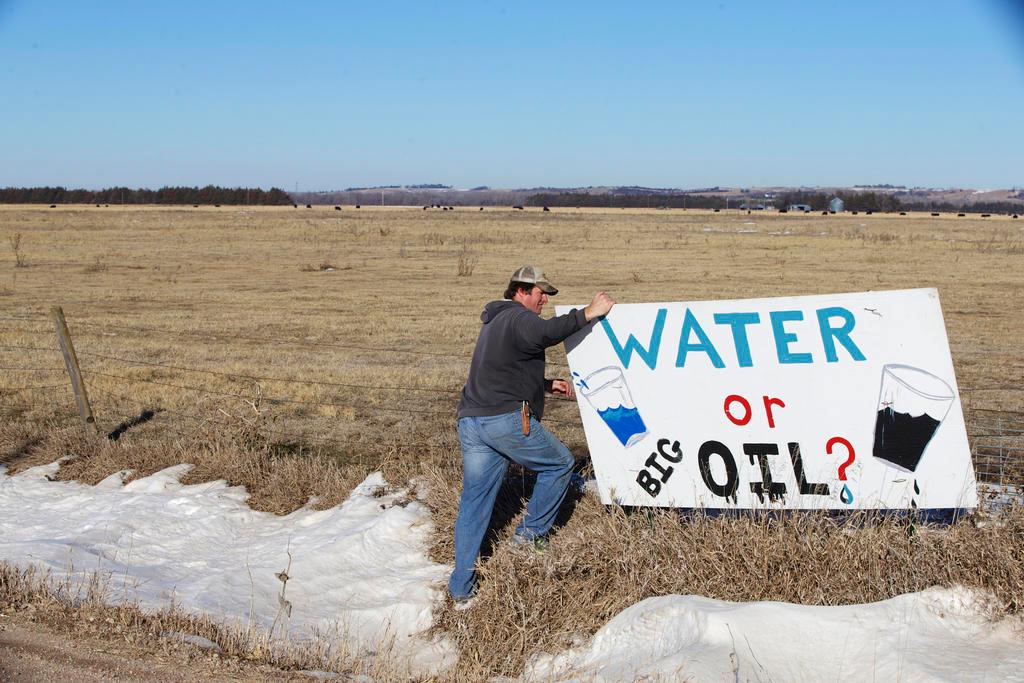
US in midst of energy soul-searching

Renewable energy will be back in the headlines in the US, if the Solar Impulse team is successful in getting its message across as it flies across the continent.
“I think there are a lot of good stories about the potential in growth in renewable energy in the US, and a lot of positive stories about how much it’s grown here already, and how much the price has come down because of that growth – I think there are a lot of positive stories. I just don’t know how much they’re permeating the general news flow here in the US,” said Kate Sheppard, an energy/environment editor for The Huffington Post.
One of the most high-profile energy debates in the US involves the proposed Keystone XL pipeline to bring as many as 830,000 barrels of Canadian oil sands crude south to Texas.
“Between that and the natural gas boom, that’s basically the only energy stories we really hear a whole lot about here in [Washington] D.C.,” Sheppard said.
“The conversation about Keystone in the US has become not really about Keystone the pipeline, but about Keystone the idea. And the idea being ‘we Republicans and some Democrats in Congress are supporting developing Keystone and this is about our energy future. And our energy future is about importing oil from our friendly neighbors in Canada,’” she said.
“The Keystone Pipeline’s been a symbolic debate in a lot of ways. Nobody thinks that one pipeline is the deciding factor on our energy future or on climate,” said Andrew Winston, founder of business consultancy Winston Eco-Strategies, and author of The Big Pivot: Radically Practical Strategies for a Hotter, Scarcer, and More Open World.
Despite the energy spent on the Keystone debate, Sheppard thinks more broadly there is a change in how Americans are thinking about other energy sources.
“They see wind farms in their community; they see solar farms; their neighbor gets solar panels on his roof. I think people are getting more used to it being something that is normal. It’s becoming something that there’s more political support on both sides of the aisle. A lot of the biggest states for wind are Republican states: Kansas, Iowa,” Sheppard said. “I do think things are changing in the politics probably a little bit slower than they’re changing in the public.”
Winston agrees that there is a shift occurring in the American debate on technology and the issue of climate change. He sees the discussion moving quickly past ‘is climate change a problem?’ to looking at what to do next.
“Talking about a lot of this as innovation is one of the major paths,” Winston said. “Someone asked me at an event, ‘what if it turns out scientists were wrong, and it’s not so bad. Are we going to regret doing this?’ And by ‘doing this’ they meant cutting back on carbon, [investing in] renewables. I wrote a piece where I said in what way would we ever regret it? We’re going to cleaner energy, we’re innovating, we’re saving money, we’re driving new thinking, we’re cleaning up the economy, etc.”
“Something like [Solar Impulse] is helpful to remind people of innovation; that we can use new technologies, and come up with new ways of doing things. And we generally like that in this country,” Winston said.
Keystone Politics
“Whereas you have the opponents of Keystone XL talking about Keystone being all about our larger climate trajectory, and what it means about our energy future, and standing against it is sort of taking a stand for action on climate, and action on moving away from fossil fuels. So it’s become sort of about what the pipeline stands for, and how we can use it to beat up the other side, and the Congressional fights, rather than about whether we’ll actually construct this physical pipeline from Canada to Texas,” Sheppard said.
The debate over Keystone XL has continued in various forms for more than six years, but the intensity ramped up this year. In January, the US Senate voted to take up a bill to approve the pipeline.
“I know senators from both sides are hungry for a real Senate debate,” Senate Majority Leader Mitch McConnell said at the time. “We’ll have an open floor debate on jobs, the middle class, infrastructure and energy.”
“In a way we’ve conflated or muddied two very separate topics. In the US oil is not really related to electricity,” Winston said. “So the debate about where do we get things like oil, or the pipeline, or are we helping build infrastructure around oil, isn’t really very much related to ‘should we build renewables.’ They serve two very different purposes. Oil is around transportation and renewables are basically electricity and grid energy.”
The Congress eventually passed the Keystone XL bill, following debates on amendments to the bill which included efforts at changing building energy efficiency standards, and others aimed at getting lawmakers to sign-on to a statement identifying a human role in climate change.
President Barack Obama vetoed the measure in March, though the issue is not decided for good.
The State Department is still expected to rule on whether to issue a permit for the international pipeline, and Keystone XL is expected to be a recurring theme in the upcoming 2016 U.S. election season.

In compliance with the JTI standards
More: SWI swissinfo.ch certified by the Journalism Trust Initiative




























You can find an overview of ongoing debates with our journalists here . Please join us!
If you want to start a conversation about a topic raised in this article or want to report factual errors, email us at english@swissinfo.ch.